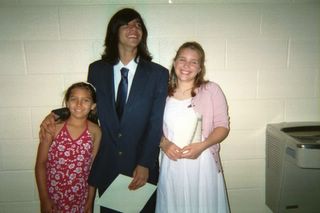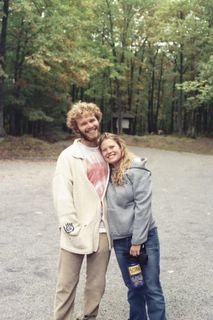

The wonderful thing about Zen practice is that you get to do it whether you like it or not.
---Zen saying
When we are not sure, we are alive.
---Graham Greene
I lay on the bowsprit, with the water foaming into spume under me, the masts with every sail white in the moonlight towering above me. I became drunk with the beauty and singing rhythm of it, and for a moment lost myself---actually lost my life. I was set free...dissolved in the sea, became white sails and flying spray, became beauty and rhythm and the high dim-starred sky....I belonged within a unity and joy to life itself.
---Eugene O'Neill
I do not want to talk about the hunting weekend. As Joel Achenbach says the incident already has had more coverage than the landing at Normandy. What interests me are the final moments of the Britt Hume interview Wednesday on SweetMother Fox:
Q On another subject, court filings have indicated that Scooter Libby has suggested that his superiors -- unidentified -- authorized the release of some classified information. What do you know about that?
THE VICE PRESIDENT: It's nothing I can talk about, Brit. This is an issue that's been under investigation for a couple of years. I've cooperated fully, including being interviewed, as well, by a special prosecutor. All of it is now going to trial. Scooter is entitled to the presumption of innocence. He's a great guy. I've worked with him for a long time, have enormous regard for him. I may well be called as a witness at some point in the case and it's, therefore, inappropriate for me to comment on any facet of the case.
Q Let me ask you another question. Is it your view that a VicePresident has the authority to declassify information?
THE VICE PRESIDENT: There is an executive order to that effect.
Q There is.
THE VICE PRESIDENT: Yes.
Q Have you done it?
THE VICE PRESIDENT: Well, I've certainly advocated declassification and participated in declassification decisions. The executive order --
Q You ever done it unilaterally?
THE VICE PRESIDENT: I don't want to get into that. There is an executive order that specifies who has classification authority, and obviously focuses first and foremost on the President, but also includes the Vice President.http://blogs.suntimes.com/sweet/2006/02/_cheney_im_the_guy_who_pulled.html
Fortunately Pete Yost, of the Associated Press, picked up on the comment yesterday...but I hardly notice the nation reeling from this announcement. Here's his account...but stick with me: I've got more questions about this~~~ http://news.yahoo.com/s/ap/20060216/ap_on_go_ca_st_pe/cheney_cia_leak;_ylt=AhYQ2.uKi46eNy37deHuedas0NUE;_ylu=X3oDMTA3OXIzMDMzBHNlYwM3MDM-
Cheney Says He Can Declassify Secrets
By PETE YOST, Associated Press Writer
Thu Feb 16, 8:36 AM ET
Vice President Dick Cheney says he has the power to declassify government secrets, raising the possibility that he authorized his former chief of staff to pass along sensitive prewar data on Iraq to reporters.
Cheney coupled his statement in a TV interview Wednesday with an endorsement of I. Lewis "Scooter" Libby, his ex-aide. Libby is under indictment on charges of perjury, obstruction and lying to the FBI about disclosing the identity of undercover CIA officer Valerie Plame.
"Scooter is entitled to the presumption of innocence," Cheney told Fox News Channel. "He is a great guy. I worked with him for a long time. I have tremendous regard for him. I may well be called as a witness at some point in the case, and it is therefore inappropriate for me to comment on any facet of the case."
In a recent court filing, Special Counsel Patrick Fitzgerald revealed Libby's assertions to a grand jury that superiors had authorized him to spread sensitive information from a National Intelligence Estimate. The administration used the NIE assessment on Iraq and weapons of mass destruction as part of its justification for going to war.
At the time of Libby's contacts with reporters in June and July 2003, the administration, including Cheney, who was among the war's most ardent proponents, faced growing criticism.
No weapons of mass destruction had been found in Iraq, and Bush supporters were anxious to show that the White House had relied on prewar intelligence projecting a strong threat from such weapons.
Fitzgerald did not specify which superiors Libby may have been referring to when he testified that higher-ups had authorized him to spread sensitive information.
But in the interview, Cheney said an executive order gives him, and President Bush, power to declassify information.
"I have certainly advocated declassification. I have participated in declassification decisions," Cheney said. Asked for details, he said, "I don't want to get into that. There's an executive order that specifies who has classification authority, and obviously it focuses first and foremost on the president, but also includes the vice president."
Libby is not charged with leaking classified information, and his lawyers said last week that there was no truth to a published report that they had advised the court or prosecutors that Libby will raise a defense based on authorization by superiors.
A legal expert said Cheney's comments could nonetheless foreshadow a Libby defense.
Former Whitewater independent counsel Robert Ray said, "If the focus is off the defendant and on to somebody else, generally for the defense that's a good day. If it turns out that Cheney was actively involved in decisions related to the disclosure of a CIA officer's identity and if the truth of it is that he was orchestrating the disclosure of information to the media, it seems to me that's a fundamentally different case than one centered around the activities of Libby."
The indictment against Libby says Cheney advised his chief of staff on June 12, 2003, that the wife of Bush administration critic and former U.S. Ambassador Joseph Wilson worked at the CIA in the counterproliferation division.
Libby understood that the vice president had learned this information from the CIA, according to the indictment, which says Libby also learned of Wilson's wife's identity from the CIA and the State Department.
On July 14, 2003, the CIA identity of Valerie Plame — the maiden name of Wilson's wife — was published by columnist Robert Novak. Eight days earlier, Wilson had accused the administration of twisting prewar intelligence to exaggerate the Iraqi threat. Wilson concluded it was highly doubtful that a purported sale of uranium yellowcake by Niger to Iraq in the late 1990s had ever taken place.
Libby was indicted last October on five counts of perjury, obstruction and lying to the FBI about how he learned of Plame's identity and what he told reporters about it.
A defense that Libby was authorized to leak sensitive data about Iraq would not appear to provide any defense against the charge of making false statements regarding Plame.
But some lawyers pointed out that setting up defenses before a jury involve more than simply constructing legal arguments.
An authorization defense in the CIA leak case would mean that "much of what Libby was trying to do was aid and protect his boss Cheney," Ray suggested. The downside to employing such an approach is that it "almost comes with a defense that I did it."
Copyright © 2006 The Associated Press.
My first question is What Executive Order is that, and who issued it? Yeah, maybe the Executive should be the one to declassify documents in his jurisdiction, but does it sound like America to you if he also declares himself to have the right to do it? Shouldn't that be something the Congress or Supreme Court would do?
Let's say a law exists on the books. The law was written by Congress and signed by the President. What if it says it's illegal to identify a covert CIA operative? Can the Executive or Vice Executive declassify information that thereby reveals such an identity without breaking that law? Can an Executive issue any Order he wants...and expect it to supercede the law of the land? Is that where we are?
I have to confess I dropped out of the only course in Constitutional Law I ever attempted in graduate school. So where can a guy like me find out about Executive Orders...and this one in particular? After 3 hours of sifting through all the questions about Cheney's shooting itself (What were those guys doing on a remote ranch with a couple of women on Valentine's Weekend without their spouses? How drunk were they? Who else has been hit by birdshot at that supposed range, what was it like, and how many layers of clothing did it go through? How close would you have to be to hit just that area of face and shoulder...and to get the shot floating through the bloodstream and into the heart? Is Whittington actually dead and the guy in the hospital an imposter?), I found that "georgia10" at Daily Kos was on top of it. http://www.dailykos.com/story/2006/2/16/104857/925
"The Executive's authority to classify or declassify information does not come from Congressional statute. Rather, Presidents have long held that it is part of the President's inherent authority. Courts have concurred.
"In 1951, President Truman signed Executive Order 10290 (pdf), the President relied on his Constitutional authority as President of the United States to enact a classification scheme. Such language has been included in classification orders since then.
"In Department of Navy v. Egan, 484 U.S. 518 (1988), the Supreme Court stated in its dicta that the authority to control access to sensitive information is vested in the President of the United States. Accordingly, an argument can be made that the President need not 'ask permission' from the CIA or NSA or anyone when it comes to classifying or declassifying information."
But where does Cheney get off saying he can do it too? What follows at Daily Kos obviously is Bush's whole strategy~~~
"Now, let's examine the current policy in the Bush administration with respect to classified information:
Sec. 1.3. Classification Authority. (a) The authority to classify information originally may be exercised only by:(1) the President and, in the performance of executive duties, the Vice President;
"This section deals with classification authority. Does it include declassification as well? If the President and Vice-President have the discretion to unilaterally classify information, would it not follow that they have the discretion to unilaterally declassify it?
"Part 3 of the order deals with declassification. Plame's identity and occupation were classified and should have remained classified. But, Cheney may have an escape route in this section:
3.1(b) It is presumed that information that continues to meet the classification requirements under this order requires continued protection. In some exceptional cases, however, the need to protect such information may be outweighed by the public interest in disclosure of the information, and in these cases the information should be declassified. When such questions arise, they shall be referred to the agency head or the senior agency official. That official will determine, as an exercise of discretion, whether the public interest in disclosure outweighs the damage to the national security that might reasonably be expected from disclosure.
"How do we know Cheney will cling to this provision for dear life if his authority to declassify is indeed challenged? Because this has been his office's defense since Day 1. Notice that the standard is 'public interest in the disclosure of information.' An extremely broad standard which provides more than enough wiggle room for Cheney to claim he authorized the leaking of Plame's identity and name to 'set the record straight' and minimize the damage Wilson was doing to the case for war. Note that this section of the Executive Order does not speak to motive. I'd also note that particular section is not new but was first enacted under President Clinton in Executive Order 12356, signed in 1995.
"Up until this point, it looks like Cheney is in the clear, at least legally speaking. But let's examine another section pertaining to declassification, Sec. 4.1. General Restrictions on Access:
4.1(c) Classified information shall remain under the control of the originating agency or its successor in function. An agency shall not disclose information originally classified by another agency without its authorization. An official or employee leaving agency service may not remove classified information from the agency's control.
"It reads that 'an agency' shall not disclose information without authorization. Does 'an agency' include the Vice-President of the United States? Yep. In the definitional section of the order:
(i) "Agency" means any "Executive agency," as defined in 5 U.S.C. 105, and any other entity within the executive branch that comes into the possession of classified information.
"So, if we accept that 'entity' includes individual entities like the Vice-President, it looks like Cheney should have asked permission from the 'originating agency' (the CIA) before authorizing Libby to leak. Also, it may be that Cheney's declassification--even if it was consistent with this order--should have gone through the mandatory declassification review in Section 3.5(a).
"Prior to March 25, 2003, the authority to unilaterally classify and perhaps declassify info was vested solely in the President. However, with Executive Order 13292, President Bush greatly expanded Vice-Presidential power. He changed many sections throughout his original order, each time granting Cheney the authority to exercise the same power as the President. Basically, any time the order stated that the President had authority to do something (which, as explained above, that authority is derived from the Constitution), Bush tacked on the phrase 'and in the performance of executive duties, the Vice President'. Bush essentially then delegated that Constitutional authority granted solely to him as Commander-in-Chief to the Vice-President of the United States.
"As 'A Patriot' points out, the timing of the March 25, 2003 order is incredibly suspicious. http://www.dailykos.com/comments/2006/2/15/192055/467/54#54 Why did the President choose March 2003 to enact such a starking aggrandizemnet of Vice-Presidential power? It was in March, as we all know, that the decision to smear Wilson was made:
Wilson connects Cheney to the events involving his wife through a meeting he said occurred in March 2003. He charged that Cheney's staff -- with at least the 'implicit' involvement of the vice president -- met and decided to investigate his background. The investigation, he said, uncovered his wife's role at the CIA.
"'The office of the vice president, either the vice president himself or more likely his chief of staff, chaired a meeting at which a decision was made to do a "work-up" on me,' Wilson wrote in The Politics of Truth.
"So the decision was made to smear the Wilson by leaking the information about his wife. Such a leak could not originate from the President's office--too dangerous, its members too high-profile, and we know that the dirty deeds have been orchestrated by the vice-president's office in the past. Did the President and the Vice-President conspire then to alter the exective order to give the Vice-President the authority to orchestrate the smear?
"Perhaps that is why Bush was able to say with such a straight face the following:
He added that he did not know of 'anybody in my administration who leaked classified information.'
Because of the changes to his order, it's possible Bush thinks that the information wasn't 'leaked,' but rather was 'declassified' by the newly vested authority by the Vice-President. Libby, as his defense claims, didn't leak 'classified' information. They read over the Intelligence Identities Protection Act and concocted the perfect defense. The act reads in part:
Whoever, having or having had authorized access to classified information that identifies a covert agent, intentionally discloses any information identifying such covert agent to any individual not authorized to receive classified information, knowing that the information disclosed so identifies such covert agent and that the United States is taking affirmative measures to conceal such covert agent's intelligence relationship to the United States, shall be fined under title 18 or imprisoned not more than ten years, or both.
"Cheney was the one with authorized access. He disclosed that information to one authorized to receive classified information. But at that moment, the information, according to Cheney, was no longer classified, giving Libby the cover to disseminate the info at will. That explains why the Bush administration has embraced a 'fine, go ahead, investigate us' attitude. They believe that, by virtue of Bush's cover-up amendments, that they have all the legal cover they need.
"The defense all along was to set this up as an authorized disclosure. This tactic is not surprising at all. Break the law, then bend the law to cover up your lawlessness.
"Do you recall that when it became clear Rove had leaked the information to reports, there was a flurry of articles about how 'upset' Bush was, that he felt betrayed by Karl? In the New York Daily News (yes, I know) there was a hint that the anger wasn't at the disclosure, but at the fact the Office of the President was tied to the leak:
A second well-placed source said some recently published reports implying Rove had deceived Bush about his involvement in the Wilson counterattack were incorrect and were leaked by White House aides trying to protect the President.
"Bush did not feel misled so much by Karl and others as believing that they handled it in a ham-handed and bush-league way," the source said.
"That's because, as this whole conspiracy illustrates, the plan was to confine the smear to the Office of the Vice-President. That is why the order was amended to give Cheney the power to smear. That is why Libby was the main leaker. When Rove's deviousness tempted him to play along, he screwed up the plan by tainting the Office of the President with the leak.
"The Vice-President's decision to declassify this information may not be judged in the courts, but rather in the court of public opinion. Courts long have been hesitant to question the President's discretion in dealing with classified materials. Does such deference extend to the Vice-President? Even if the legal cover-up here withstands or avoid judicial review, what will the public make of the fact that Vice-President Cheney committed a crime, but President Bush chauffeured the getaway car?"
This is my first reading of anything by georgia10, and I must say I am impressed indeed. But after all this, here's what I want to know:
Let's say the President and Vice President decide that somebody's report is not creditable because the man's wife had something to do, however remote, with his getting the assignment. Let's say they don't believe in cronyism anymore. What's to stop them from calling a press conference and declaring the situation openly? Why can't they order somebody else to check Wilson's work if it's wrong? Why didn't they?
~~~~~~~~~~~~~~~~~~~~~~~~~~~~~~~~~~~~~~~~~~~~~~~~~~~~~~~~
For those of you interested in the different perspectives of what went on at that 50,000 acre ranch, here's a pile of links~~~
Molly Ivins wondering how liberal Whittington is http://www.alternet.org/story/32240/Arianna Huffington about the Armstrong "get-away" and all the deals that have been made there, including Cheney's 30 years of hanging out there http://www.huffingtonpost.com/arianna-huffington/armstrong-ranch-a-gop-ba_b_15820.htmlBoston Globe compilation of Cheney's history of secrecy http://www.boston.com/news/nation/washington/articles/2006/02/17/activists_assert_secrecy_is_cheneys_hallmark/?page=fullHoward Dean calls on Cheney to resign http://news.yahoo.com/s/ap/20060213/ap_on_go_pr_wh/cia_leak;_ylt=AsG61N1ZoY37xO2l8zOF2QQGw_IE;_ylu=X3oDMTA3OXIzMDMzBHNlYwM3MDM-Veteran hunters talk about birdshot http://www.iht.com/articles/2006/02/16/news/shot.phpWhittington actually is dead (this is humor) http://blogs.washingtonpost.com/achenblog/2006/02/cheneys_entoura.htmlHundreds of questions remain after the Fox interview http://www.washingtonpost.com/wp-dyn/content/blog/2006/02/16/BL2006021601183.htmlBryan Zepp's typically brilliant essay about hunting drunk in Texas http://www.zeppscommentaries.com/VRWC/cheneydrunk.htm
And oh yes, the unbelievable prayer visualization that illustrates this article http://summitlh.com/visualize/presidency/cheney1.html




